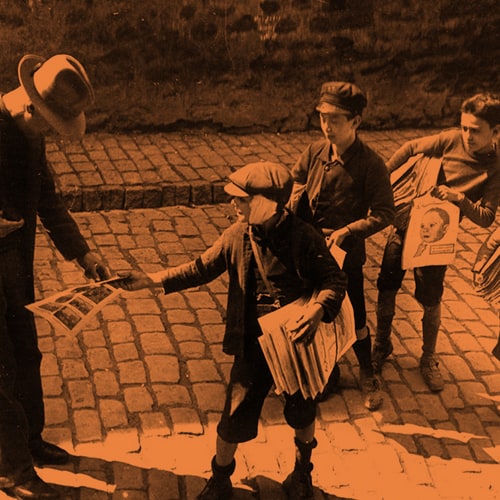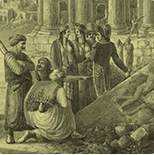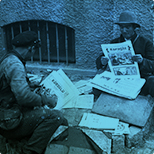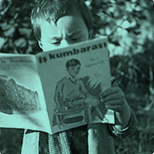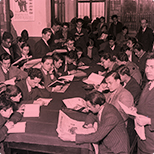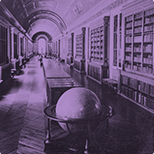YILLIK: Annual of Istanbul Studies is a peer reviewed, open access, international academic journal featuring cutting-edge research on Istanbul’s past and present, published by the Istanbul Research Institute in print and online (via Dergipark).
YILLIK: Annual of Istanbul Studies is accepting submissions of original research articles, opinion pieces (Meclis), book and exhibition reviews in English or Turkish, by researchers working on any period of the city through the lens of history, history of art and architecture, archaeology, sociology, anthropology, geography, urban planning, urban studies, and other related disciplines in humanities or social sciences.
Click here for our calls for papers.
Click here for our Publication and Peer Review Ethics Statement.
Indexing/Abstracting
YILLIK is currently indexed by SCOPUS, TRDizin, ERIH PLUS, the MLA International Bibliography and Asos İndeks.
Under Review
Directory of Open Access Journals, Web of Science, EBSCO, Index Islamicus, ProQuest
For subscription inquiries, please contact us via istanbulstudies@iae.org.tr.
YILLIK: Annual of Istanbul Studies 7 (2025)
The seventh volume of YILLIK: Annual of Istanbul Studies features eight peer-reviewed research articles delving deep into Istanbul's historical, social, and cultural fabric. Yavuz Aykan examines the microhistory of information exchange and narrative construction between Istanbul and Paris surrounding the 1730 Patrona Halil Rebellion. Utku Can Akın and Mustafa Türkan, recipients of the Early Career Article Prize, innovatively reconstruct one of the most famous maritime accidents on the Bosporus—the collision between the ships Petar Zoranić and World Harmony. Gökay Kanmazalp explores how members of the Galatasaray High School community constructed urban memory and identity in the mid-twentieth century. Akgün İlhan's article discusses how Istanbul's water transfer projects reshape urban and rural lives. Working with literary-historical materials, Fatih Altuğ reads Safiye Erol's Kadıköyü'nün Romanı (Kadıköy's Novel) through the lens of assemblage and affect theories. Two complementary articles invite us to critically approach visual materials: Gizem Aslan and Ezgi Yavuz explore the 1961 film Otobüs Yolcuları (Bus Passengers) for its potential in writing architectural history, and Dilara Ulu analyzes Vladimir Zender's photographs of early republican Istanbul. Finally, İhsan Sefa Özer rigorously documents the nineteenth-century biography of a property in Ayazma Kapı, receiving an Honorable Mention for the Early Career Article Prize.
In the Cabinet section, Yavuz Selim Güler delves into a special series of early twentieth-century Kütahya ceramics by Minas Avramidis. In the Meclis section, Deniz Türker, author of the most recent and comprehensive monograph on Yıldız Palace, revisits the site to examine the outcome of its recent restoration. Muratcan Zorcu presents an 1828-30 narrative as a source for Istanbul's climate history. Buket Coşkuner shares her insights from organizing the Palestine from Above exhibition in Istanbul while a genocide was unfolding in Gaza. From a double piece by advisory board member Paolo Girardelli and Andrea Savorani Neri, we learn that the Bolulu Habip Bey Mansion, more famously known as Bulgur Palas (recently renovated and opened to the public by the Istanbul Metropolitan Municipality), was designed by Alessandro Valeri, whose family history reflects the entangled universe of the late nineteenth-century Levantine Mediterranean. Our thirteen book and exhibition reviews, commissioned and edited by Nurçin İleri, Jessica Varsallona, and Ulya Soley, range from studies of Byzantine monuments and Islamic neighborhoods to an introductory survey of Ottoman history and a critique of the Venice Architecture Biennale, and include Nicholas Melvani's featured review of Studies in Byzantine History and Culture: A Festschrift for Paul Magdalino. As always, the volume concludes with the Istanbul Bibliography 2025, compiling the latest research on Istanbul.
Istanbul Research Institute Publications 55
Periodicals 15
Istanbul, December 2025
ISSN: 2687-5012
To access the online contents of the journal, please visit DergiPark.
YILLIK: Annual of Istanbul Studies 6 (2024)
The sixth volume of YILLIK: Annual of Istanbul Studies features four peer-reviewed research articles delving deep into the historical, social, and cultural fabric of Istanbul. Günseli Gürel, recipient of the Early Career Article Prize, reevaluates the perceptions and historical narratives surrounding Hagia Sophia in Ottoman written accounts of the fifteenth and sixteenth centuries. Alaaddin Tok's study examines the development of a multi-layered energy infrastructure in late Ottoman Istanbul, characterized by the simultaneous use of wood, coal, and petroleum. The article by Oğulcan Avcı and Nurcan Boşdurmaz reassesses the historical trajectory of the Fatih Sultan Mehmed Mosque, built north of Anadoluhisarı by Sultan Mehmed II and demolished in the early Republican period. Through archival documents and maps, the authors aim to correct gaps and inaccuracies in the literature. In the final research article of this year’s YILLIK, Güzin Yeliz Kahya maps the spatial distribution of creative industries in Istanbul, arguing that urban cultural policies should embrace creative clusters in both central and peripheral areas.
In the Meclis section, the second installment of the Interventions to Istanbul Studies series, edited by advisory board member Koray Durak, presents articles amplifying the voices of Istanbul’s Rum (Greek) community to reestablish the city’s social fabric. Christine Philliou investigates the erased and rediscovered elements of Valide Han’s history, tracing the traces of the Rum community. Paul Magdalino discusses Ilias Makridis’ experiences in Istanbul between 1901 and 1912 through his unpublished memoir, shedding light on the Rum community of the period. Firuzan Melike Sümertaş examines the loss of Istanbul’s Rum Literary Society Syllogos and explores mapping as a counter-act. Koray Durak discusses Byzantine studies in the 1950s, Istanbul’s Greek-speaking community, and the Tenth International Congress of Byzantine Studies. Çiğdem Kafescioğlu offers a new perspective on the conquest of Istanbul, evaluating the post-conquest state of the Rum community. Stefanos Yerasimos presents a map of Beyoğlu drawn by a Rum child, revealing the spatial experiences of the Rum community.
In the Cabinet section, Özge Baykan Calafato evaluates photographs by Namık Görgüç and Selahattin Giz from the Suna and İnan Kıraç Foundation Photography Collection, exploring how photography in early Republican Turkey shaped and reinterpreted individuals’ representations of modern Turkish citizenship. The Reviews and Istanbul Bibliography section includes ten book reviews and two exhibition analyses. In a special review, İpek Türeli focuses on the exhibitions Istanbul as Far as the Eye Can See:Views across Five Centuries at Meşher and On the Spot:Panoramic Gaze on Istanbul, a History at Pera Museum, assessing the historical development of Istanbul’s panoramic depictions. As always, the volume concludes with the Istanbul Bibliography 2024, compiling the latest research on Istanbul.
Istanbul Research Institute Publications 53
Periodicals 13
Istanbul, December 2024
ISSN: 2687-5012
To access the online contents of the journal, please visit DergiPark.
YILLIK: Annual of Istanbul Studies 5 (2023)
The new volume of YILLIK: Annual of Istanbul Studies is released, after major additions to its advisory and editorial boards. YILLIK 5 (2023) opens with a peer-reviewed dossier, co-edited by one of our new subject editors, Ümit Fırat Açıkgöz, together with Yaşar Tolga Cora, on Armenian agencies in Istanbul’s capitalistic transformation in the nineteenth and early twentieth centuries. The dossier begins with a detailed historiographical introduction by Açıkgöz, and includes three research articles by Cora, Aslıhan Günhan, and Sarine Agopian, the latter of whom was awarded our Early Career Article Prize.
In addition to the special dossier, there are four research articles that examine Istanbul’s architectural, cultural, energy, and economic histories from the fourteenth to the nineteenth centuries, by Selin Sur-Ufuk Serin, Gürbey Hiz-Ayşe Şentürer, Kazuma Iwata, and Hande Betül Ünal. Cabinet presents three anonymous panoramic views of Istanbul from the early nineteenth century. These paintings were recently added to the Suna and İnan Kıraç Foundation Orientalist Paintings Collection and are currently on display in Pera Museum’s On the Spot: Panoramic Gaze on Istanbul, a Historyexhibition. Meclis features Emre Güldoğan’s report on the İstYA archaeological field survey in Şile. The Reviews section begins with a featured review of Yannis Stouraitis’ 2022 edited volume Identities and Ideologies in the Medieval East Roman World, by Anthony Kaldellis. It continues with essays on seven books and one exhibition. As always, the journal concludes with the most recent edition of the Istanbul Bibliography.
Periodicals 12
Istanbul, December 2023
ISSN: 2687-5012
To order the print issue click here.
To access the online contents of the journal, please visit DergiPark.
Research Articles
Special Dossier Introduction | Capitalistic Urbanization in Late Ottoman Istanbul: Armenian Agencies
Ümit Fırat Açıkgöz
Urban Modernization of Late Ottoman Kadıköy and the Memoirs of Hovhannes Kalfa Stepanian
Sarine Agopian | Early Career Article Prize
The Failed Housing Cooperative Project of the Oriental Savings Association: Housing and Urban Rent in Istanbul in the 1880s and 1890s
Yaşar Tolga Cora
Bourgeois Wealth, Architecture, and Urbanization: The Azaryan Family in Late Ottoman Istanbul
Aslıhan Günhan
***
A Reappraisal of the Genoese Walls of Galata (Fourteenth–Fifteenth Centuries) in Terms of Medieval Building Techniques and Masonry Traditions
Selin Sur and Ufuk Serin
Producing, Transporting, and Distributing Charcoal: From the View of the Charcoal Merchants’ Guild in the Eighteenth Century in Istanbul and Its Surrounding Regions
Kazuma Iwata
A Collection of Late Ottoman Imaginations, Constructions, and Experiences: Servet-i Fünûn
Gürbey Hiz and Ayşe Şentürer
The Venues of Musical Performances in the Early Eighteenth Century and the Rûznâmes of Mahmud I (r. 1730–1754)
Hande Betül Ünal
Cabinet
Three Anonymous Istanbul Views from the Early Nineteenth Century
Meclis
İstanbul İli Yüzey Araştırmaları (İstYA) Projesi 2021–2022 Yılı Çalışmaları: Şile;
Emre Güldoğan
Reviews and Istanbul Bibliography
Identities and Ideologies in the Medieval East Roman World
Anthony Kadellis
The Cambridge Companion to Constantinople
Ivana Jevtić
Latin Catholicism in Ottoman Istanbul: Properties, People & Missions
Elif Bayraktar-Tellan
Hayal ve Gerçek Arasında: Osmanlı Resminde İstanbul İmgesi, 18. ve 19. Yüzyıllar
Emine Fetvacı
Byzantium after the Nation: The Problem of Continuity in Balkan Historiographies
Artemis Papatheodorou
Korku Metropolü İstanbul: 18. Yüzyıldan Bugüne
Yağmur Yıldırım
İstanbul Art Nouveau’su
Soner Demir
Bosphorus/Bosporos (Boghaz-içi) from Byzantine to Latin and Ottoman Times (4th–15th Centuries): Constantinople Viewed from the North-East Water Currents
Daniele Tinterri
Venedik Mimarlık Bienali Türkiye Pavyonu
Bihter Çetinyol
Istanbul Bibliography 2023
Cemre Melis Yordamlı
YILLIK: Annual of Istanbul Studies 4 (2022)
The 2022 volume of YILLIK: Annual of Istanbul Studies marks the centenary of the end of Allied occupation in Istanbul in the immediate aftermath of World War I with a special Meclis dossier on the occupied city—a strikingly understudied period of the city’s urban history—co-edited by Daniel-Joseph MacArthur-Seal and Gizem Tongo. This dossier, with contributions by Ekaterina Aygün, Lerna Ekmekcioglu, Artemis Papatheodorou, Ceren Abi, Erol Ülker, and Claire Le Bras, accompanies the exhibition Occupied City: Politics and Daily Life in Istanbul, 1918–1923 (Meşgul Şehir: İşgal İstanbul’unda Siyaset ve Gündelik Hayat, 1918–1923) held at the Istanbul Research Institute between January 11 and December 26, 2023, curated by MacArthur-Seal and Tongo. Both the exhibition and the dossier not only mark the centenary but also showcase some of the most innovative research on Istanbul’s post-World War I period and point to new lines of inquiry that move beyond the national and nationalist historiographies that often dominated the study of the period.
One of the peer-reviewed articles of YILLIK 4, “Projections of Xenophobia: The Capitulations, Employment, and Anglo-Turkish Relations in the 1920s” takes the story from the occupation into the first years of the republic and discusses issues of coexistence in the workplace while the public trauma of war, ethnic violence, and occupation were still very alive in Istanbul. Orçun Can Okan’s critical study of xenophobia in post-imperial Istanbul is the winner of our Early Career Article Prize. Namık Günay Erkal’s and Firuzan Melike Sümertaş’s “Of a Piece with Their Habitations”: Phanariots and Their Houses on the Phanar Waterfront” provides a tour-de-force treatise on the phenomenon of “Phanar houses,” through a multifaceted architectural, historical, and historiographical analysis. The final peer-reviewed article of this year’s YILLIK, “Bell Ringing in Latin Pera: Sounds and Silence,” by Alex Rodriguez Suarez, explores an interesting part of Istanbul’s historical soundscape through the nonlinear history of bell ringing in Pera.
In this year’s Cabinet, unlike previous issues in which our invited authors discussed visual and literary artworks in Suna and İnan Kıraç Foundation (SVIKV) Collections, Mine Yıldırım critically engages with a private letter, also part of the SVIKV Collections, as a window into politics of animal welfare and human-animal relations in early republican Istanbul. Our reviews section, which includes five book and one exhibition review, is headlined by a featured review essay by James Grehan on A Companion to Early Modern Istanbul, co-edited by Shirine Hamadeh and Çiğdem Kafescioğlu, and followed by the Istanbul Bibliography 2022.
Since it was revamped in 2019 as a peer-reviewed journal, YILLIK: Annual of Istanbul Studies has been carrying the tradition of serious scholarly study of Istanbul that had been established by İstanbul Araştırmaları Yıllığı / Annual of Istanbul Studies, under the editorship of M. Baha Tanman. A mainstay for the work of both journals since 2012, Tanman will continue to provide his guidance as part of the Editorial Board of YILLIK, while he passes the editor position to K. Mehmet Kentel. Our readers and contributors will surely join all of us on the Editorial Board in thanking Professor Tanman for his excellent leadership of ten years.
Finally, one of the most salient yet rather unpronounced aspects of YILLIK since its relaunch in 2019 has been its unconventional design for an academic journal, proving, we believe, that it is indeed possible to make academic reading an aesthetic experience. It is with great pleasure we would like to announce that this unconventional design has received an Achievement Award at the 41st Graphic Design Awards organized by GMK, and we use this opportunity to thank our journal’s designer, Volkan Şenozan, for his beautiful—and now very deservedly pronounced—work for YILLIK.
Onto the new volumes with critical, peer-reviewed, indexed scholarship, presented in a visually striking way.
The Editorial Board
Click here to access YILLIK: Annual of Istanbul Studies 4 (2022).
Research Articles
Namık Erkal | Firuzan Melike Sümertaş – “Of a Piece with Their Habitations”: Phanariots and Their Houses on the Phanar Waterfront
Orçun Can Okan – Projections of Xenophobia: The Capitulations, Employment, and Anglo-Turkish Relations in the 1920s
Alex Rodriguez Suarez – Bell Ringing in Latin Pera: Sounds and Silence
Cabinet
Mine Yıldırım – A Compassionate Correspondence: On the Humane Killing of Street Dogs in Istanbul
Meclis
Daniel-Joseph MacArthur-Seal | Gizem Tongo – Representing Occupied Istanbul: Documents, Objects, and Memory
Ekaterina Aygün – What Russian-Language Publications Tell Us about Refugee Life in Occupied Istanbul
Lerna Ekmekcioglu – Mourning Bliss: Remaining Armenian(s) in Occupied Constantinople
Artemis Papatheodorou – The Hellenic Literary Society at Constantinople between Ottomanism and Greek Irredentism
Ceren Abi – Cooperation and Contestation: Cultural Heritage in Occupied Istanbul
Erol Ülker – A Social Democratic Party in Istanbul during the Post-Armistice Years
Claire Le Bras – Policing and Security in Occupied Istanbul
Reviews and Istanbul Bibliography
Shirine Hamadeh and Çiğdem Kafescioğlu, eds., A Companion to Early Modern Istanbul. Leiden: Brill, 2022. xxx + 757 pages, 57 figures, 6 tables. ISBN: 9789004468566. Reviewed by James Grehan.
Nathanael Aschenbrenner and Jake Ransohoff, eds., The Invention of Byzantium in Early Modern Europe. Washington, D.C.: Dumbarton Oaks, 2021. xviii + 457 pages. ISBN: 9780884024842. Reviewed by Paul Stephenson.
Avner Wishnitzer, As Night Falls: Eighteenth-Century Ottoman Cities after Dark. New York: Cambridge University Press, 2021. xiii + 376 pages, 8 figures. ISBN: 978110883214. Reviewed by Oumaïma Jaïdane.
Enno Maessen, Representing Modern Istanbul: Urban History and International Institutions in Twentieth Century Beyoğlu. London: I.B. Tauris, 2022. 208 pages, 4 figures and 1 table. ISBN: 9780755637461. Reviewed by Nilay Özlü.
Şehzade’nin Sıra Dışı Dünyası: Abdülmecid Efendi. Sakıp Sabancı Müzesi, 21 Aralık 2021–28 Ağustos 2022. Küratör: Nazan Ölçer. Reviewed by Bihter Sabanoğlu.
François Georgeon, Au Pays du Raki: Le vin et l’alcool de l’Empire ottoman à la Turquie d’Erdoğan (XIVe–XXIe siècle). Paris: CNRS Éditions, 2021. 368 sayfa, 24 şekil. ISBN: 9872271131201. Reviewed by Burak Onaran.
Click here to order the printed issue.
YILLIK: Annual of Istanbul Studies 3 (2021)
After all, Hagia Sophia is hardly an innocent participant in the vicissitudes of empire.
In the first piece of the “Interventions to the Istanbul Studies” special dossier in this year’s Meclis, Roland Betancourt reminds us of the imperial and violent legacies of Hagia Sophia. We had begun working on the “Interventions” series back in the Summer of 2020, amid the biggest wave of the Black Lives Matter protests that swept across North America as well as many other parts of the world in the wake of the killing of George Floyd, and in response to the intertwined issues of police brutality and systemic racism. We were inspired by succes¬sive academic associations that affirmed their commitment to fighting against racism and anti-Blackness, exposing and eradicating issues of discrimination embedded in their fields. That was also the time when the public in Turkey as well as students of Ottoman, Byzan-tine, and Turkish studies were heavily engaged with the debates around the re-conversion of Hagia Sophia into a mosque. As the move was justified or criticized based on differing interpretations of the legal and symbolic status of the monument, as well as contradicting visions of larger histories of Istanbul, we witnessed firsthand how the study of Istanbul was instrumentalized and politicized for the goals and ambitions of competing stakeholders. Yes, neither Hagia Sophia and Istanbul, nor the research devoted to them, have been “innocent participants in the vicissitudes” of empires, nation-states, ideologies, and other manifestations of power and resistance. As we have cherished the emerging spaces for academic and public discussions initiated by our colleagues worldwide on our own disciplines’ complicity and willful participation in systems of oppression, we have realized that we must also commit to self-reflexivity and open Istanbul studies to a critical investigation of its own biases, embedded discriminations, and habits of objectification and tokenism. Under the generous guidance and co-editorship of three members of our Advisory Board—Koray Durak, Cemal Kafadar, and Christine Philliou—we are excited to present the first three pieces of our “Interventions to Istanbul Studies” series, where Betancourt is joined by Zavier Wingham and Lerna Ekme¬kcioglu. We are hoping that this series will contribute to ongoing critical discussions on the study of Istanbul and its connected fields.
The critical study of Istanbul does not begin or end in our special dossier, of course. The third volume of YILLIK includes five research articles on different periods of Istanbul, written from a variety of perspectives, using diverse methods. The Early Career Article Prize is awarded to Ezgi Dikici, whose erudite study of the properties of court eunuchs in early modern Istanbul brings a new perspective to how the members of the royal household engaged with their urban setting. Gavin Moulton’s article on the Şişli Mosque critically engages with the ways in which the mid-twentieth-century architectural practice reimagined and appropriated the stylistic vocabulary of Ottoman architecture; while Semra Horuz shows how Ottoman intellectuals traveling to Europe in the nineteenth century reimagined Istanbul and projected their ambitions for their capital to the European towns they visited. Gökçen Erkılıç brings the insights of a materialist methodology into the study of the transformation of Istanbul’s ports and coastal zones. Finally, Muhammed Tatlısu situates Karabet Keşişyan as a central figure in the Ottoman history of publishing and printing in the late nineteenth and early twentieth centuries. The fact that two research articles of the present volume highlight the importance of Black and Armenian actors in the history of Istanbul is apropos given the goals of our special Meclis dossier.
In addition to the special dossier, this year’s Meclis includes M. Baha Tanman’s notes on the recent restoration of the Haseki Mosque. In Cabinet, Alison Terndrup analyzes a nineteenth-century engraving that depicts an eighteenth-century courtly procession from the Suna and İnan Kıraç Foundation Collection. We publish four book and two exhibition reviews, with topics varying from the architectural practice and discourse in the last two decades in Turkey to the famous bronze horseman of Justinian. Our reviews section is fol¬lowed, as always, by the most recent edition of the Istanbul Bibliography.
The third volume of YILLIK, just like the second, has been prepared in the midst of the COVID-19 global pandemic. As the disease took its toll on our communities in numerous ways, Istanbul studies has lost one of its brightest minds. Yavuz Sezer (1979–2021), an architectural historian of the Ottoman Empire, passed away on March 24, while we were expecting an article submission from him. Our scholarly community also lost, not due to the pandemic, one of its most esteemed members, architectural historian Doğan Kuban (1926–2021), who passed away on September 22. We are privileged to publish two In Memoriam pieces by his student and colleague Zeynep Ahunbay, and his colleague and niece Zeynep Kuban. The latter piece presents a bibliography of Kuban’s work on Istanbul compiled by Zeynep Kuban and her students. This volume is therefore dedicated to the memories and intellectual legacies of Dr. Sezer and Professor Kuban.
The Editorial Board
Click here to access YILLIK: Annual of Istanbul Studies 3 (2021).
Research Articles
Ezgi Dikici – Eunuchs and the City: Residences and Real Estate Owned by Court Eunuchs in Late Sixteenth-Century Istanbul
Gavin Moulton – Mid-Century Sinan: Vasfi Egeli and the Turkish Republic’s First Mosque
Semra Horuz – Touring Europe, Envisioning Homeland: Istanbul in Two Nineteenth-Century Ottoman Travelogues
Muhammed Tatlısu – Kitapçı Karabet Efendi’nin Osmanlı Matbuatına Katkıları Üzerine Bir Methal
Cabinet
Alison Terndrup – Procession and Continuity: A Nineteenth-Century View of an Eighteenth-Century Ceremony
Meclis
M. Baha Tanman - İstanbul Haseki Camii’ne İlişkin Bazı Gözlemler
Koray Durak, Cemal Kafadar, Christine Philliou – Introduction: Interventions to Istanbul Studies
Roland Betancourt – The Monuments We Privilege, or, How to Write an Ethical History of Byzantium
Zavier Wingham – Arap Bacı’nın Ara Muhaveresi: Under the Shadow of the Ottoman Empire and Its Study
Lerna Ekmekcioglu – Of Dark Pasts and Pipe Dreams: The Turkish University
In Memoriam
Zeynep Ahunbay –In Memoriam: Doğan Kuban (8 Nisan 1926–22 Eylül 2021)
Zeynep Kuban – Introducing Doğan Kuban’s Istanbul Bibliography
Reviews and Istanbul Bibliography
Bülent Batuman, Milletin Mimarisi: Yeni İslamcı Ulus İnşasının Kent ve Mekân Siyaseti. Trans. Şahika Tokel. Istanbul: Metis, 2018. Reviewed by Hasan Turgut.
Esra Akcan, Open Architecture: Migration, Citizenship, and the Urban Renewal of Berlin-Kreuzberg by IBA–1984/87. Basel: Birkhäuser, 2018. Reviewed by Kathleen James-Chakraborty.
Zeynep Çelik, Europe Knows Nothing about the Orient: A Critical Discourse from the East (1872–1932). Istanbul: Koç University Press, 2021. Reviewed by Yeliz Çavuş.
Elena N. Boeck, The Bronze Horseman of Justinian in Constantinople: The Cross-Cultural Biography of a Mediterranean Monument. Cambridge: Cambridge University Press, 2021. Reviewed by Brigitte Pitarakis.
Fatih’in Rönesansı. İBB Saraçhane Belediye Sarayı, October 6–December 4 2020, Istanbul. Curated by Nurhan Atasoy. Reviewed by Sevil Enginsoy Ekinci.
Cohabitation: A Manifesto for the Solidarity of Non-Humans and Humans in Urban Space. ARCH+gGmbH in cooperation with silent green, Berlin, June 4–July 4, 2021. Reviewed by Yelta Köm
Istanbul Bibliography 2021. Compiled by Ryan Mitchell and Miray Eroğlu.
To order the print issue please write to our sales contact.
YILLIK: Annual of Istanbul Studies 2 (2020)
Istanbul is a city of careless, sensitive, callous, vulnerable, and drifting souls, who touch, hurt, love, and hate each other […] The violence it is subjected to ever increases. And one finds it more difficult to find a harmony in this chaos, to breathe alongside the rising skyscrapers, and to be in peace with the city as historic and symbolic places are destroyed or converted one by one…
The words of the co-editors of one of the two thematic dossiers (“Imagining the City”) in YILLIK 2’s Meclis ring even more true in late 2020, as it has become literally more difficult to breathe not only alongside the city’s skyscrapers but under our masks, and breathing in close proximity to each other remains a public as well as individual health risk. Only a few months after Çiğdem Kafescioğlu opened our inaugural volume by writing—and recounting from Mustafa Âli—“this city is a realm of rain; [of ] frustration, fear, and death; a realm of venom and blood in the days of the plague; a realm of grief and sorrow for the expelled and the poor in tears,” Istanbul found itself at the epicenter of the COVID-19 pandemic in Turkey. The number of people it has affected are unclear, but the stories of frustration, fear, poverty, death, grief, and sorrow abound. The pandemic has only deepened and crystallized the spatial and environmental inequalities embedded in the making of the present-day city.
Crystallized further is the coexistence of humans and nonhumans alike and the impact of nonhuman (f)actors on urban life. The unending encroachment upon wildlife by humans is the primary reason behind the rise of global pandemics, and the loss of urban green spaces in metropolises such as Istanbul is a major factor that worsens the impact. In a year when many of us—who can afford to—work from home, our dependence on the networks established through physical infrastructures of broadband, wireless, and satellite systems, to sustain our virtual proximities, has reached hitherto unseen levels. In Istanbul, living, working, loving, and dying are now assembled at the intersection of all of these networks—human and nonhuman, virus and wireless—as is the case with producing YILLIK’s 2020 volume, made possible by the work of authors, editors, copyeditors, designers, typesetters, assistants, and printers, all physically distant from one another.
It might be too early to provide full-blown analyses of the current pandemic’s impact on Istanbul, but YILLIK’s second volume does provide perspectives from the history of medicine with Fezanur Karaağaçlıoğlu’s and Akif Ercihan Yerlioğlu’s articles. The former is a study of the plague in nineteenth-century Galata-Pera, and the latter, “‘May Those Who Understand What I Wrote Remember This Humble One’: Paratextual Elements in Eighteenth-Century Ottoman Medical Manuscripts” is the winner of our Early Career Article Prize.
Further historical perspectives help YILLIK to record Istanbul’s present-day transformation, as in the case of Hasan Sercan Sağlam’s article on the Galata Tower, which was subjected to a contested takeover by the Ministry of Culture and Tourism and a controversial restoration in recent months. Serra Akboy-İlk offers a historiographical discussion in her article on early republican architectural discourse, while Gábor Fodor delves into the history of one of the first foreign research institutions established in Istanbul.
In Cabinet, Brigitte Pitarakis provides a close reading of Byzantine iconography on a nineteenth-century paper icon from the Suna and İnan Kıraç Foundation Collection portraying the Second Coming and Last Judgment.
In Meclis, the first thematic dossier, co-edited by Olcay Akyıldız and Zeynep Uysal, is an outcome of the Pera Museum’s 2014 symposium “Imagining the City,” with pieces by Selim Sırrı Kuru, Hatice Aynur, Handan İnci, and a photo essay by Murat Germen that offers a vivid display of Istanbul’s brutal transformation in recent years and the spatial inequalities this has fostered. The second thematic dossier in Meclis marks Hagia Sophia’s recent reconversion to a mosque, probably the most consequential event in 2020 concerning Istanbul’s historical heritage. Edited by Brigitte Pitarakis, with pieces by Pitarakis, Arietta Papaconstantinou, and Koray Durak, it deals with experiencing Hagia Sophia in the past, and the diverse encounters with it, for as Papaconstantinou puts it, “like the stones that composed its decoration, so its visitors came from all over the empire and beyond.” These are accompanied by Marios Philippides’ piece on the “dating” of one of the most important dates in the city’s history: May 29, 1453.
YILLIK’s 2020 volume also features an expansive range of both book and exhibition reviews on a variety of topics, from the reception and appropriation of Byzantium into modernism to Islamic art in North American museum collections. Lastly, the Istanbul Bibliography, compiled by our student assistants, once again brings together current research on Istanbul.
Now onto the next one, with hopes for a better year ahead as we continue to keep record of Istanbul’s past, present, and possible futures.
The Editorial Board
Click here to access YILLIK: Annual of Istanbul Studies 2 (2020).
Peer-reviewed articles
Fezanur Karaağaçlıoğlu – Exotic and Toxic? Plague in Early Nineteenth-Century Galata-Pera
Akif Ercihan Yerlioğlu – “May Those Who Understand What I Wrote Remember This Humble One”: Paratextual Elements in Eighteenth-Century Ottoman Medical Manuscripts
Hasan Sercan Sağlam – Galata Kulesi’nin Ceneviz Dönemine Yönelik Bir Yeniden Değerlendirme
Serra Akboy-İlk – Building the Architectural Narrative of the Topkapı Kara Ahmed Pasha Mosque Complex in Early Republican Turkey
Gábor Fodor – Harp İstanbul’unda Macar Arkeolojisi: Konstantinopolis Macar Bilim Enstitüsü (1916-1918)
Cabinet
Brigitte Pitarakis – The Naked Soul at the Scales: A Paper Icon in the Suna and İnan Kıraç Foundation Collection
Meclis
Olcay Akyıldız, Zeynep Uysal – Şehri Hayal Etmek: İstanbul Tahayyülleri
Selim Sırrı Kuru – İki Şehrin Şiiri: Gazelde İstanbul ve Galata İkilisi
Hatice Aynur – Tatavlalı Mahremî’nin Şehnâme’sinde Suriçi İstanbul’u
Handan İnci – Hangi İstanbul? Ahmet Hamdi Tanpınar ve Orhan Kemal’in Gözünden Şehre Bakmak
Murat Germen – Şimdilerde Şehir: Hayal Kırıklığı
Brigitte Pitarakis – Hagia Sophia, God’s Chosen Ruler, and St. Nicholas: New Perspectives on the Macedonian Dynasty
Arietta Papaconstantinou – The Sound of a Thousand Tongues: Visitors to Constantinople from the Eastern Provinces in the Sixth Century
Koray Durak – Hapishanede Ayasofya’yı Düşünmek: El-Ömerî ile Balaban’ın Kostantiniyye’deki Ulu Kilise Üzerine Sohbeti
Marios Philippides – The Date of the Conquest of Constantinople: May 29, 1453?
Reviews and Istanbul Bibliography 2020
Florin Leonte, Imperial Visions of Late Byzantium: Manuel II Palaiologos and Rhetoric in Purple. Reviewed by Paul Magdalino
Gülsün Tanyeli, “Hiçbir Üstâd Böyle Kâr Etmemişdir”: Osmanlı İnşaat Teknolojisi Tarihi. Reviewed by Damla Gürkan-Anar
Zeren Tanındı, Yazıda Âhenk ve Renk: Sadberk Hanım Müzesi Koleksiyonundan Sanatlı Kitaplar, Belgeler ve Hüsn-i Hatlar. Reviewed by Aslıhan Erkmen
Christopher Houston, Istanbul, City of the Fearless: Urban Activism, Coup d’État and Memory in Turkey. Reviewed by Sinan Erensü
Priscus, Fragmenta et Excerpta: Attila ve Bizans Tarihi. Trans. and ed. Turhan Kaçar. Reviewed by Aslıhan Akışık-Karakullukçu
Ayten Alkan, ed., Şehir ve Hayvan. Reviewed by Onur İnal
Roland Betancourt and Maria Taroutina, ed., Byzantium/Modernism: The Byzantine as Method in Modernity. Reviewed by: Przemysław Marciniak
Inspired by the East: How the Islamic World Influenced Western Art. Reviewed by Leyla Kayhan Elbirlik
Connectivités (Connectivities). Reviewed by Ekin Can Göksoy
Modernisms: Iranian, Turkish, and Indian Highlights from New York University’s Abby Weed Grey Collection. Reviewed by Lydia Harrington
Istanbul Bibliography 2020. Compiled by Osman Kocabal and Deniz Özcan
To order the print issue please write to our sales contact.
YILLIK: Annual of Istanbul Studies 1 (2019)
Click here for the Call for Papers of the second issue.
A direct successor of İstanbul Araştırmaları Yıllığı / Annual of İstanbul Studies—the academic journal of Istanbul Research Institute published annually between 2012 and 2018—YILLIK is a peer-reviewed and open-access journal published simultaneously in print and online (via DergiPark).
Peer-reviewed articles of YILLIK: Annual of Istanbul Studies 1 (2019) cover a wide range of topics from the changing spatial and visual practices in the early modern Istanbul to the 10th Congress of Byzantine Studies held in Istanbul in 1955, dealt with a variety of novel approaches coming from different disciplines such as urban and architectural history, history of science, music, and historiography.
From this year onward, an article written by a student or a researcher who has defended their doctoral theses within the last five years will be awarded the Early Career Article Prize. We wholeheartedly congratulate Nilay Özlü, the winner of the inaugural prize, with her article “Silent Guardians of the Regime: The ‘Lost’ Police Stations of the Topkapı Palace.”
One of the new sections of the journal, the Cabinet is devoted to short essays by renowned experts on historical documents from the collections of the Suna and İnan Kıraç Foundation (SVIKV). In the first issue, Selim S. Kuru writes on Küsnâme of Tacîzâde Cafer Çelebi, found within the Baldırzâde Mecmuası of the SVIKV Manuscript Collection.
Another new section, Meclis, is designed to serve as a space where proceedings from the events organized by SVIKV can appear, and for critical interventions to current debates on Istanbul. In the first Meclis, we present the proceedings of “Istanbul and Music” Studies Program’s (İMAP) Inaugural Panel, held at the Pera Museum in November 2018.
Reviews and Istanbul Bibliography section features five book reviews and one exhibition review, as well as the newest version of the Istanbul Bibliography, which we have published since 2012.
The call for papers for this issue, which also announced our new format, declared that it would be the eighth issue. However, the name change necessitated a new ISSN, which required us to relaunch our journal with the issue no. 1. Perhaps it was only appropriate for a journal, after a complete transformation of its content, design, and advisory board, to begin afresh with a new title, and from the first issue.
To our old and new readers and potential authors, greetings!
YILLIK: Annual of Istanbul Studies 1 (2019)
Contents
Çiğdem Kafescioğlu – Sokağın, Meydanın, Şehirlilerin Resmi: On Altıncı Yüzyıl Sonu İstanbul’unda Mekân Pratikleri ve Görselliğin Dönüşümü
Hatice Gökçen Özkaya – İstanbul’da On Yedinci Yüzyıl Evlerinde Yaşama Mekânları
Nilay Özlü – Silent Guardians of the Regime: The ‘Lost’ Police Stations of the Topkapı Palace
Ayhan Han – Osmanlı Döneminde Yerebatan Sarnıcı ve Mahallesi
Bilge Ar – İşgal İstanbul’unun Kentsel Dönüşümünü Beyaz Ruslar Üzerinden Okumak
Buket Kitapçı Bayrı – The 10th International Congress of Byzantine Studies, Istanbul, September 15–21, 1955
Hasan Baran Fırat – Dönemlendirme Çalışmaları ve Osmanlı-Türk Müziği Tarihyazımı: Bir Bilanço Denemesi
Cabinet
Selim Sırrı Kuru – A Radical Discourse of Desire: Küsnâme
Meclis
Walter Feldman – The Emergence of Ottoman Music and Local Modernity
Panagiotis C. Poulos – Spaces of Intercommunal Musical Relations in Ottoman Istanbul
Reviews and Istanbul Bibliography
Muhammed Zinciroğlu – Istanbul Bibliography 2019
To order the print issue please write to our sales contact.

